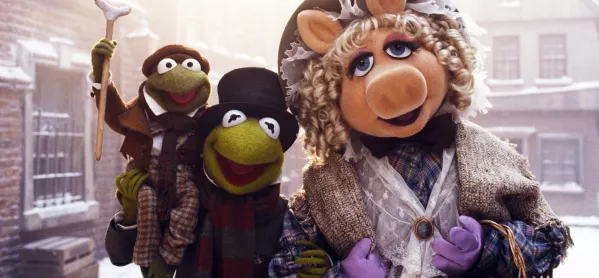- Home
- Sex and frogs: Why English teachers hate showing films
Sex and frogs: Why English teachers hate showing films

Seeing a beloved text adapted for film is never easy. Back in the 1990s, I tutted and huffed my way through the BBC’s Pride and Prejudice (“Mr Darcy would never dive into a lake - and, anyway, Colin Firth is too short…”).
No one was listening. Little did I realise that barely two decades later, social media would provide me with a forum for just such outrage.
But, as an English teacher, there’s an additional layer of grief. Every time a classic is given a modern twist, my heart sinks. Not just because I’m a tiresome pedant or because I want to rein in anyone else’s creative vision.
No, it’s because I know that - whether I choose to show my students the moving-image version or not - somehow the modern twists will turn up with infuriating precision in their writing.
Amphibian Bob Cratchit
Think about it: how many times has Romeo’s gun - or car or tattered Hawaiian shirt - cropped up in essays? Or the unquestioned assertion that not only is Bob Cratchit a frog but his good lady a pig?
First, let’s address the issue of showing what we still hilariously call “videos” as part of the curriculum. There’s stern disapproval in some quarters about teaching a text via any means other than the printed word.
In the wake of discredited VAK, all I can say is thank God for dual coding; it’s now fine to show pictures in lessons again. However, there are times when the kids are stuck, morale is low and a decent film version is worth its weight in gold.
So, having got that one out of the way, there’s the issue of what makes a suitable adaptation to show alongside the text.
Out, damned nipple!
Macbeth is a thorny one. There are several films available to the English teacher. There are complicated #MeToo politics about using the Polanski version. But, it has to be said, the opening scenes of his 1970s Macbeth look right: cold and bloody, with a brooding Jon Finch staring into space as his soliloquies are intoned in voiceover.
But, about a third of the way through, it goes wrong: there’s an appearance by a juvenile Keith Chegwin as the most irksome Fleance imaginable. And then a fight scene in full armour goes on so long and so ponderously that the whole class become hysterical with muffled laughter long before Macbeth is decapitated.
Then there’s the version with Patrick Stewart - sorry Patrick, too old - where midshot scenes featuring Lady Macbeth’s evening dress really should have been reshot. I can imagine the production meeting: “It’s only a hint of nipple - no one will notice,” without considering thousands of teenagers up and down the country who will not only notice it, but notice only it and nothing else.
An inspector dunnit
And don’t start me about the BBC adaptation of An Inspector Calls, in which Eva Smith appears as a living, breathing character, rather than an enigmatic off-stage plot device.
Against my better judgement, I allowed a thoroughly disaffected Year 11 group to watch this version. They perked up significantly when they realised some of the cast also featured in Peaky Blinders. Finally, I thought, engagement!
But it all went to pieces during the closing scenes: Eva drinks disinfectant while a shifty looking inspector lurks outside her lodgings.
“Well, that explains it,” cried one of my students. “The inspector did it!”
There was a murmur of assent from the rest of the class, and I spent the next six weeks vainly attempting to correct this misconception.
Previously reluctant to write anything, the entire class was quite happy to churn out pages explaining exactly why the inspector was the bad guy.
No sex, please - we’re English teachers
I have advice for would-be filmmakers who want to avoid the wrath of English teachers.
First of all, stick to the plot. OK, cut bits out if you must (although the pirates-in-Hamlet exam debacle last year mean even this editorial choice can be risky), but don’t add stuff.
Yes, the Macbeths probably did have children, but we don’t need to see them.
The recent BBC A Christmas Carol, reimagined by the makers of the ubiquitous Peaky Blinders - complete with a snarling, foul-mouthed Scrooge - really should have been called Peaky Blinders With a Hint of Dickens.
And, finally, please refrain from inserting unnecessary sex scenes where - even though there’s a tight focus on the characters’ faces - there is absolutely no doubt that an intense representation of vigorous sexual intercourse is taking place on the screen.
Oh, and time it so there’s a cliffhanger every 54 minutes, so there’s time to take the register, get the projector to work and stand quietly behind chairs at the end of the lesson. We’ll thank you for it.
Sarah Ledger has been teaching English for 33 years. She tweets @sezl
Keep reading for just £1 per month
You've reached your limit of free articles this month. Subscribe for £1 per month for three months and get:
- Unlimited access to all Tes magazine content
- Exclusive subscriber-only stories
- Award-winning email newsletters



